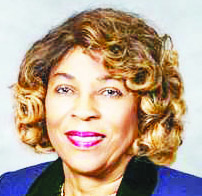
From the desk of Senator Joyce Waddell
Update for the week of October 18, 2021

October 22, 20211 1:30PM

Greetings:
This week we are working on possible maps for redistricting, which should be completed by the end of this week. This is a very challenging process.
Joyce Waddell
Patient Visitation
During the coronavirus pandemic, especially the first months of restrictions, loved ones were not allowed to visit patients in hospitals and other healthcare settings. The result was that people died without a loved one present. For more than a year, state lawmakers have worked on a bill to make sure that will not happen again. Senate Bill 191, the “No Patient Left Alone Act,” was signed into law on Friday. The law becomes effective on Nov. 1. Visitation must be allowed for patients and residents in these settings:
- Hospitals
- Nursing homes and combination homes
- Hospice care facilities
- Adult care homes and special care units
- Residential treatment facilities
The new law declares that visitation rights will not be impacted during declared states of emergency and disasters. “The COVID-19 pandemic has caused great uncertainty and anxiety across our State and has significantly affected patients and residents in health care facilities,” the bill states. It also includes that while health care facilities made “many efforts to keep patients and employees in a safe environment,” those COVID-19 prevention measures resulted in unintended consequences for patients and residents who were not diagnosed with COVID-19. Earlier this year, the board chair of Friends of Residents in Long Term Care, said that early in the pandemic, it was difficult to know what to do about visitation rules. “We’ve been saying over and over again that family and loved ones are an integral part of the care system,” he said in May. The final version of the bill passed the General Assembly on Oct. 6, unanimously.
When an earlier version of the bill passed the Senate in May it was called it a “small step” to make sure it would never happen again in North Carolina. A similar 2020 bill failed to pass the legislature. In September, the Governor signed into law a similar bill, House Bill 351, called “Clifford’s Law,” which requires visitation protocols for nursing homes during emergencies to be established by the DHHS secretary. More than 17,000 North Carolinians have died from COVID-19 since the start of the pandemic in 2020.
I supported SB 191, because no one should die alone. They should be comforted by friends or family there to support them at their final hour.
State Pensions
Social Security benefits will increase 5.9 percent next year – the largest increase in 39 years – to help retirees keep up with inflation. Retired state workers are calling on lawmakers to follow Social Security’s lead, saying their state pensions have continued to lose ground to inflation since the recession more than a decade ago. Unlike Social Security, North Carolina’s state pension system is not linked to the cost of living. Instead, state lawmakers decide when and by how much to increase payments, and they have not approved a significant boost in about 12 years.
“Inflation is real,” said the executive director of the North Carolina Retired Governmental Employees’ Association. The Teachers’ and State Employees’ Retirement System serves nearly 234,000 retirees and their survivors, earning an average annual pension of almost $21,100. The executive director said state retirees’ pension checks have lost so much ground to inflation in recent years that they’re getting only 84 cents to the dollar. “They are living on fixed incomes, and, you know, the reality is they are trying to make decisions between health care, food and living,” he said.
I filed a bill requesting a 5% increase and I hope that it will be considered. I continue to stress the need for an increase in a cost-of-living adjustment, especially since inflation continues to increase.
This year, with a budget surplus nearing $8 billion, the retired state workers are asking for a 2 percent permanent increase to their pensions. “With such a surplus and so much excess funds available, they could have funded the [cost-of-living adjustment] without any problem at all, in our opinion,” he said.
The Governor’s budget proposal included that 2 percent raise, plus a 2 percent bonus both this year and next year. The House budget had the one-time bonuses but no permanent raise, while the Senate did not include anything for retired workers in its proposed budget.
A final budget is being negotiated by legislative leaders and the Governor’s administration. The House Speaker said a permanent increase is on the table during the budget negotiations. It has been said that a bonus would be welcome. But it does not help maintain pension values in the long run.



